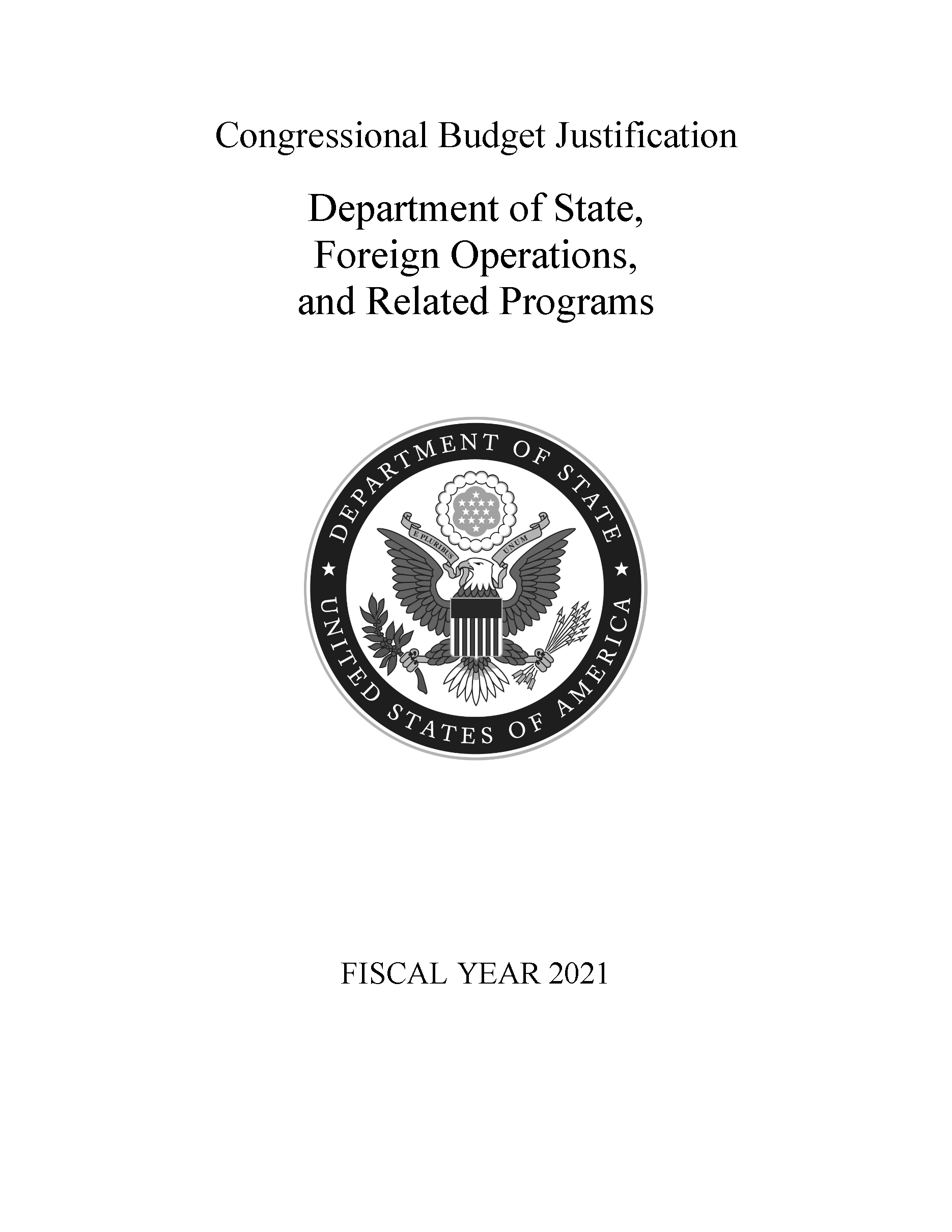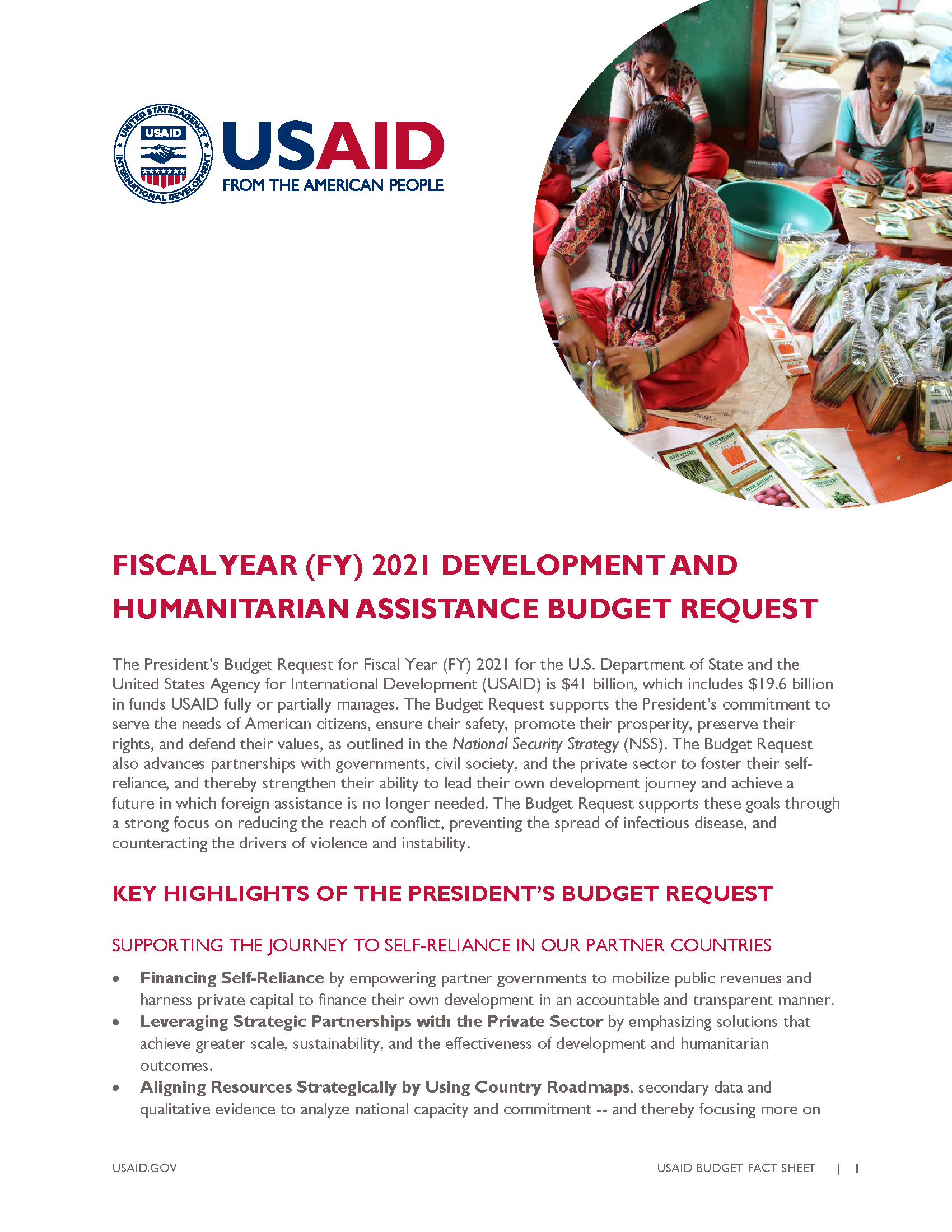Speeches Shim
The President’s Budget Request for Fiscal Year (FY) 2021 for the U.S. Department of State and the United States Agency for International Development (USAID) is $41 billion, which includes $19.6 billion in funds USAID fully or partially manages. The Budget Request supports the President’s commitment to serve the needs of American citizens, ensure their safety, promote their prosperity, preserve their rights, and defend their values, as outlined in the National Security Strategy (NSS).
The Budget Request also advances partnerships with governments, civil society, and the private sector to foster their self-reliance, and thereby strengthen their ability to lead their own development journey and achieve a future in which foreign assistance is no longer needed. The Budget Request supports these goals through a strong focus on reducing the reach of conflict, preventing the spread of infectious disease, and counteracting the drivers of violence and instability.
KEY HIGHLIGHTS OF THE PRESIDENT’S BUDGET REQUEST
SUPPORTING THE JOURNEY TO SELF-RELIANCE IN OUR PARTNER COUNTRIES
- Financing Self-Reliance by empowering partner governments to mobilize public revenues and harness private capital to finance their own development in an accountable and transparent manner.
- Leveraging Strategic Partnerships with the Private Sector by emphasizing solutions that achieve greater scale, sustainability, and the effectiveness of development and humanitarian outcomes.
- Aligning Resources Strategically by Using Country Roadmaps, secondary data and qualitative evidence to analyze national capacity and commitment -- and thereby focusing more on what is helping and hindering the Journey to Self-Reliance in an objective, data-driven way. For example, in the Africa region, the Budget Request includes significant increases for Ethiopia, Mozambique, Niger, regional programs in the Sahel, and targeted decreases for Nigeria, Tanzania, and Uganda based on analysis of each country’s self-reliance strengths and weaknesses.
- Redefining Development Relationships when partner countries show relatively advanced levels of self-reliance to a model of U.S. engagement that relies on other forms of cooperation, such as greater U.S. private investment and technical assistance from the private sector.
RENEW AMERICA’S COMPETITIVE ADVANTAGE FOR SUSTAINED ECONOMIC GROWTH AND TO CREATE JOBS
- Advance an Inclusive and Secure Digital Environment to counter malign influences and advance internet freedom in alignment with the NSS.
- Empower Women to Contribute to Global Economic Growth and Political Stability by helping women advance in the workforce and as entrepreneurs, and by creating the enabling environment for success through the Women’s Global Development and Prosperity Fund, as well as through the programs that support the Women, Peace, and Security Act.
- Promote Trade and Investment in Africa by requesting additional resources for Prosper Africa to expand two-way trade and open markets for American businesses and exports, while countering the People’s Republic of China, the Kremlin, and other malign competitors.
ENHANCE THE EFFECTIVENESS OF FOREIGN ASSISTANCE BY BUILDING THE USAID OF TOMORROW
- Advance a Field-Driven Mission and Strengthen Technical Expertise through the new Bureau for Development, Democracy and Innovation (DDI) as a hub for Agency-wide expertise and technical support to integrate innovation and private-sector engagement through all USAID’s programming.
- Support Innovative Finance by continuing to build the connection between USAID and the U.S. International Development Finance Corporation (DFC). The Budget will support complementary, mission-led, development finance-related programming that will leverage private sector resources to maximize the impact of the American tax dollar.
- Align Resources with the Global Food Security and Water Strategies through the new Bureau for Resilience and Food Security to address the underlying causes of food-insecurity and increase the number of people who live above the poverty line.
- Strengthen Operations and Capital Investments for a Strong USAID. The Budget Request supports a total of 1,757 Foreign Service Officers and 1,342 Civil Service positions, while also streamlining functions that will enhance the effectiveness of foreign assistance and USAID’s core responsibilities.
PROTECT AMERICA’S SECURITY AT HOME AND ABROAD
- Protect U.S. Strategic Interests in the Indo-Pacific Region by promoting a free, open, and secure Indo-Pacific region under the Administration’s Indo-Pacific Strategy, which advances the rule of law, open markets, fair and reciprocal trading frameworks, freedom of navigation, and economic growth led by the private sector.
- Counter Authoritarian Influence by strengthening bilateral relationships, advancing transparent governance and energy-diversification, and supporting reforms that address structural instability and political and economic back-sliding.
- Prevent the Spread of Infectious Diseases Abroad and Improve Global Public Health Outcomes, including with funds for the President’s Emergency Plan for AIDS Relief (PEPFAR) and USAID’s global health programs (GHP-USAID). The Budget Request includes a pledge of $1.16 billion for Gavi, The Vaccine Alliance, over four years, our largest multi-year commitment, to protect an additional 300 million children, prevent at least seven to eight million future deaths, and fund stockpiles of vaccine for emergency use to stop dangerous outbreaks.
CHAMPION AMERICAN VALUES BY PROMOTING DEMOCRACY, GOVERNANCE, AND HUMAN RIGHTS
- Protect Religious Freedom and Support Persecuted Religious and Ethnic Minorities by prioritizing initiatives that anticipate, prevent, and respond to persecution of, and attacks against, individuals and groups on the basis of their religion, including ensuring their survival through establishing livelihoods and equal access to public services.
- Expand Opportunities to Promote Lasting Stability, Peace and Democracy by supporting key U.S. allies and partners to serve as a stabilizing force in our shared commitment to the principles of democracy, individual liberty, and the rule of law. The Budget Request provides $205 million to support Venezuela’s democratic institutions following a transition, and for the urgent health needs of the Venezuelan people.
- Support the Dignity of Individuals by promoting American values in human rights, citizen-responsive governance, civil society, labor, and political liberties. The Budget expands assistance to counter trafficking in persons (TIP) in targeted countries on the Tier II Watch List in the Department of State’s annual Trafficking in Persons Report to advance democracy and prevent backsliding into the Tier III list. The Budget Request includes investments to increase participatory, representative and inclusive political processes, promote greater accountability, and to strengthen universally recognized human rights.
MAINTAIN U.S. GLOBAL HUMANITARIAN LEADERSHIP WHILE EXPECTING OTHERS TO DO MORE
- Provide Leadership in Response to Humanitarian Crises by financing humanitarian and food assistance for populations affected by conflict and disasters and building resilience, reducing the rise of disasters, and preparing for emergencies. The United States will strengthen its efforts to improve greater global public burden-sharing of relief, while providing funding that, when combined with carryover resources, exceeds the second highest level ever.
- Optimize Humanitarian Assistance Outcomes: The President’s Budget Request proposes to consolidate the implementation of all overseas humanitarian assistance at USAID, as supported by several independent analyses, and through a new, more flexible appropriations account, to respond most effectively and seamlessly to evolving humanitarian needs, achieve optimal reforms at the United Nations, induce other donors to do their fair share, and resolve ongoing crises.



Comment
Make a general inquiry or suggest an improvement.